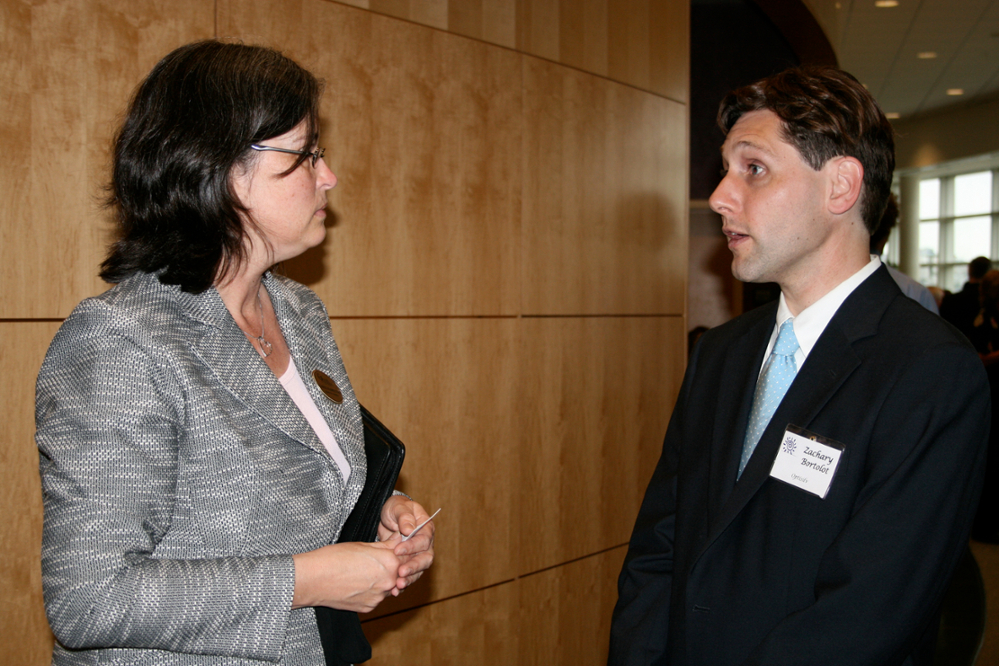JMU Puts Up $50,000 for Sustainable Business and Entrepreneurship
News
First, 54 contestants entered. Then there were 12. The Final Four presented their plans to the public and a panel of judges on the evening of April 20. Amid photo flashes, TV crews, cameras and a live audience, the top contender was announced.
The Center for Entrepreneurship in the College of Business at James Madison University launched its first Sustainable Business Plan Competition on Monday, April 20, 2009. Four venture teams pitched their business plans for a chance to win up to $50,000 and in-kind services.
Zachary Bortolot, assistant professor of integrated science and technology at JMU, received top honors for his business plan for Optisilv LLC, a remote sensing software for forest inventory applications.
Bortolot developed the software that combines digital aerial photographs and a related technology known as light detection and ranging (lidar) with ground data to perform forest inventories at a lower cost and more accurately than traditional techniques. Bortolot is co-owner of the company with John Paul McTague and Mark Milligan.
In March, the CFE received 54 executive summaries during the first round from competitors representing JMU students, faculty, staff, alumni and entrepreneurs from an eight-county area in the Shenandoah Valley.
Those submissions were evaluated to identify the top 12 contenders and then the final four, based on the viability of the business concept, the strength of the sustainability elements, the long-term growth potential and the ability to launch within one year.
Bortolot's product is based on timberland management processes whereby forest inventories are routinely performed to account for benefits (e.g., for carbon trading) and to maximize the forests' economic and environmental benefits. Forests are a renewable source of building materials and paper products and remove large quantities of carbon dioxide from the atmosphere, placing it in long-term storage. Bortolot is a resident of Bridgewater, Va., while his partners reside in Florida.
Three additional business plans proposed viable business operations based in the Shenandoah Valley. Eastern BioPlastics, LLC, owned by Sonny Meyerhoeffer, is a green technology startup company in Harrisonburg that is currently custom designing machinery and processes to manufacture biodegradable plastics from poultry feathers. The plastics would be marketed to greenhouses and nurseries that currently use petroleum-based plastics for containers and films used as weed barriers.
Secure Futures, LLC, based in Staunton, proposed a solar energy alternative, a Triple-E Solar manufacturing, installation, financing and organizational structure to enable large tax-exempt entities to benefit from a lower than grid-parity priced electricity through 20- to 25-year Solar Prepaid Power Purchase Agreements for 500 kW solar installations at their sites.
The company has already secured the interest of Eastern Mennonite University, the City of Staunton and a Charlottesville-based non-profit. If the company can secure startup capital, it would be the first solar energy company of its kind in the nation. The company would manufacture and install lightweight, durable, recyclable solar panels and create jobs.
The Friendly City Food Co-op, based in downtown Harrisonburg, offered the final sustainable business plan. The 500-plus-member food co-operative proposed a full service grocery that offers healthy, locally produced foods.
"The business proposals illustrate the vibrant entrepreneurial spirit in the JMU community and the Shenandoah Valley. These business concepts range from energy-efficient design to social networks to alternative energy solutions," Carol Hamilton said of the 54 submitted plans. Hamilton is the assistant director of CFE and organizer of the SBPC.
"The plans propose innovations and resourceful collaborations that address gaps in the market for more options in areas such as organic food, sustainable design, improved health care, personal fitness and information technology," Hamilton said, referring to the 54 original plans submitted.
While the top two presenters - Optisilv and Eastern BioPlastics - will receive funding and services, such as accounting and marketing assistance, to support their startups, Robert D. Reid, dean of the College of Business said all four teams were viable businesses.
"There is no last place here this evening. Last place was decided weeks ago when 54 plans were reviewed. The teams here this evening represent the top four viable plans," Reid said.
The College of Business is committed to preparing students to be active and engaged citizens who are exceptionally well qualified leaders for success in a global competitive marketplace. Graduates of the CoB exhibit a combination of technical and interpersonal skills that produce exceptional employees, earning them the Madison Quotient designation.
